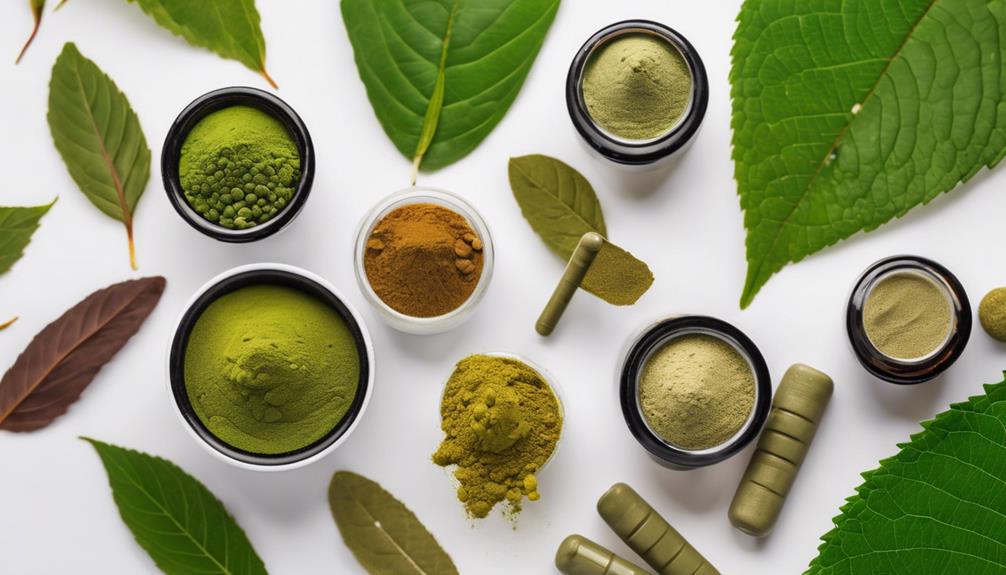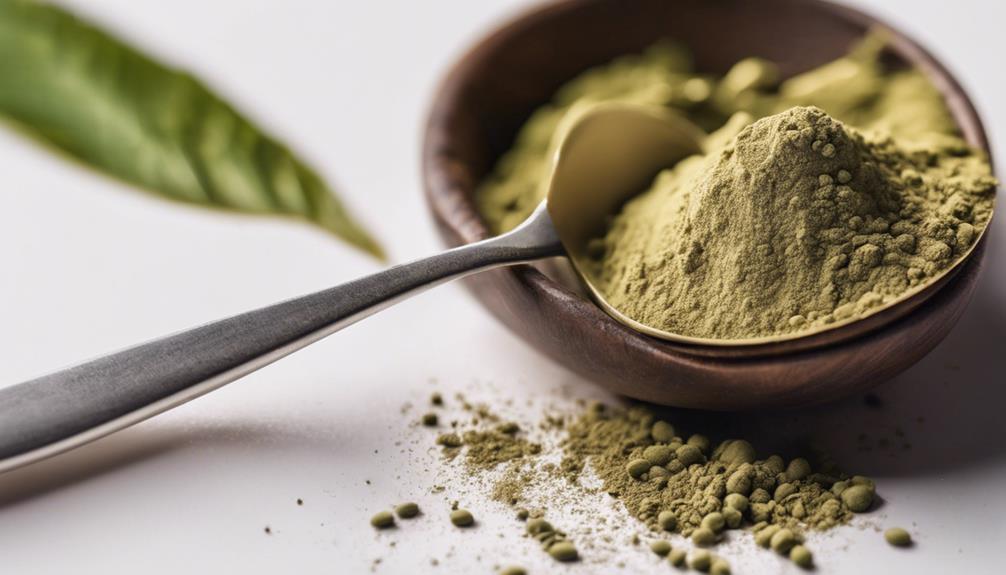Deprecated: mb_convert_encoding(): Handling HTML entities via mbstring is deprecated; use htmlspecialchars, htmlentities, or mb_encode_numericentity/mb_decode_numericentity instead in /home/users/kratomfiles/www/kratomfiles.com/wp-content/plugins/quick-adsense-reloaded/includes/template-functions.php on line 3552
Are you tired of feeling trapped by your addiction to kratom, desperately seeking a way out but unsure of where to turn? At the Kratom Detox Center, we understand the struggle you're facing. Our expert team is here to guide you through the detox process with compassion and expertise, providing you with the tools and support you need to break free from the grip of kratom addiction. But that's just the beginning. As you continue on this journey, we'll also equip you with the skills to prevent relapse and maintain long-term recovery. Intrigued? Stay with us to discover how our holistic approach and evidence-based therapies can help you reclaim your life from kratom addiction once and for all.
Understanding Kratom Addiction

To understand kratom addiction, it is crucial to recognize that this plant native to Southeast Asia contains psychoactive compounds that can bind to opioid receptors in the brain, leading to stimulant-like effects at low doses and opioid-like effects at higher doses. Kratom use has been associated with increased sociability, alertness, and energy, but it's important to be aware of the potential risks. These risks include common side effects like nausea, constipation, and dizziness, as well as more severe health effects such as seizures and liver injury.
While there are no specific diagnostic criteria for kratom use disorder, studies suggest that it carries addiction potential. People who become dependent on kratom may experience withdrawal symptoms when they stop using it. These symptoms can include anxiety, tremors, nausea, and joint pain. If you or someone you know is struggling with kratom addiction, it's important to seek professional help and treatment.
Medical professionals in addiction treatment centers can provide evidence-based care for kratom addiction. Treatment options may include detoxification to safely manage withdrawal symptoms, as well as various forms of behavioral therapy to address the underlying causes of addiction. Peer support and comprehensive care programs tailored to individual needs are also important components of recovery.
It's worth noting that the use of kratom for medicinal purposes is not approved by the FDA in the United States. Therefore, seeking help from medical professionals who specialize in addiction treatment is essential for ensuring the safety and effectiveness of any treatment plan. Remember, you don't have to face kratom addiction alone. Help is available, and recovery is possible.
The Detox Process
Understanding the potential risks and addiction potential of kratom, it is important to now explore the detox process for individuals struggling with kratom addiction. Detoxing from kratom involves the uncomfortable experience of withdrawal symptoms and cravings, both physically and mentally. It is crucial to seek medical assistance during the detox process to ensure safety and increase the chances of successful recovery.
At a kratom detox center, individuals can receive 24/7 medical support and holistic treatment interventions that aim to ease the discomfort of withdrawal. Medically assisted detox programs offer the safest option for those who are physically dependent on kratom and are seeking to overcome their addiction. These programs provide a structured and supervised environment where medical professionals can monitor the individual's progress and adjust the treatment plan accordingly.
The table below provides a visual representation of the detox process for kratom addiction:
| Detox Process for Kratom Addiction |
|---|
| 1. Physical dependence on kratom |
| 2. Withdrawal symptoms and cravings |
| 3. Medically assisted detox programs |
| 4. 24/7 medical support and holistic treatment interventions |
| 5. Increased comfort and safety during the detox process |
Detoxing from kratom without medical assistance can be painful and may increase the risk of relapse and overdose. Seeking support from a caring staff and a recovery community during detox can help ease feelings of isolation and increase comfort and safety. The detox process is an essential first step towards overcoming kratom addiction and transitioning into long-term treatment and recovery.
Supportive Therapies for Recovery

Supportive therapies for recovery from kratom addiction include behavioral therapy, counseling, and group therapy. These therapies aim to address underlying issues, provide coping strategies, and support individuals in their journey towards recovery. A comprehensive treatment approach at a kratom detox center may involve a combination of these supportive therapies to ensure a holistic and well-rounded recovery process.
During the initial phase of recovery, medical detoxification under professional supervision can help manage withdrawal symptoms and ensure physical safety. This process allows individuals to safely rid their bodies of kratom while receiving the necessary medical support. In addition to medical detox, individual therapy sessions can be beneficial in exploring the root causes of addiction and developing personalized strategies for recovery.
Group counseling is another valuable supportive therapy that provides individuals with a sense of belonging and support from others who have similar experiences. Sharing experiences, challenges, and successes in a group setting can foster a sense of community and provide individuals with a network of support throughout their recovery journey.
For some individuals, an outpatient program may be suitable, allowing them to receive supportive therapies while still maintaining their daily responsibilities. Others may benefit from a residential treatment program, where they can immerse themselves in a supportive and structured environment.
Holistic interventions, such as mindfulness practices, yoga, and nutritional support, can also contribute to overall wellness and aid in the recovery process. These complementary therapies focus on the mind-body connection and can help individuals manage stress, improve physical health, and enhance their overall well-being.
Aftercare planning and ongoing support are essential in preventing relapse. Continued therapy, relapse prevention strategies, and lifestyle adjustments can help individuals maintain their sobriety and navigate the challenges they may face after leaving the kratom detox center.
Preventing Relapse
When focusing on preventing relapse from kratom addiction, it is crucial to identify triggers and develop coping strategies to effectively manage stress, cravings, and emotional challenges during the recovery process. At a kratom detox center, you will receive the support and guidance needed to navigate this critical phase of addiction recovery.
One key aspect of preventing relapse is engaging in ongoing therapy and support groups. These resources provide a strong network of individuals who understand the challenges of kratom use and can offer guidance in maintaining sobriety. By regularly attending therapy sessions and participating in support groups, you can gain valuable insights and coping skills to help you stay on track.
Creating a structured daily routine and setting achievable goals is another important strategy in preventing relapse. By establishing a sense of purpose and direction in your life, you can reduce the likelihood of turning to kratom as a way to cope with boredom or uncertainty. Additionally, practicing self-care and making healthy lifestyle choices, such as exercising regularly, eating nutritious meals, and getting adequate sleep, can contribute to your overall well-being and reduce the risk of relapse.
Staying connected with healthcare professionals and counselors is essential during the recovery process. They can monitor your progress, address any emerging concerns, and provide support when needed. It is important to remember that relapse is a common part of the recovery journey, and seeking treatment promptly can help mitigate the physical and mental health risks associated with kratom use and opioid withdrawal symptoms.
Continuing Care After Detox

Consider transitioning to an intensive outpatient program (IOP) or partial hospitalization program (PHP) as a crucial step in continuing care after detox from kratom addiction. These programs provide ongoing support and treatment while allowing you to maintain your daily responsibilities. By participating in IOP or PHP, you can receive regular therapy and counseling to address any underlying issues that may have contributed to your drug use. This type of ongoing care is essential for preventing relapse and maintaining long-term recovery.
In addition to therapy and counseling, it is important to engage in support groups and peer support networks. These can provide a sense of belonging and accountability, allowing you to connect with others who are going through similar experiences. Building a sober community can provide the support and encouragement needed to stay on track in your recovery journey.
To support your mental health and overall well-being, consider exploring holistic treatments such as meditation, yoga, and mindfulness practices. These practices have been shown to have positive effects on mental health and can help alleviate stress and anxiety, which are common triggers for relapse.
Working with medical professionals, develop a comprehensive aftercare plan that suits your individual needs. This may include regular check-ins, medication management, and additional therapy sessions. By having a well-rounded aftercare plan, you can ensure continued success in your sobriety.
Continuing care after detox is crucial for maintaining your recovery from kratom addiction. By transitioning to an IOP or PHP, participating in support groups, and exploring holistic treatments, you can address the underlying issues that contributed to your addiction and build a strong foundation for long-term sobriety. Remember, you don't have to face this journey alone – there are resources and support available to help you every step of the way.
What is the treatment process like at a Kratom Detox Center for liver damage caused by Kratom?
At a Kratom Detox Center, the treatment process for reversible liver damage from kratom typically involves medication to manage symptoms, dietary changes to support liver health, and supervised detox to remove the substance from the body. Patients also receive counseling and support to address any underlying issues contributing to kratom use.
What Are the Benefits of Kratom Detox and How Can It Help with Addiction?
Kratom detox offers numerous benefits for individuals struggling with addiction. The natural properties of the kratom plant can help ease withdrawal symptoms and reduce cravings, making the recovery process more manageable. Seeking professional support and incorporating kratom detox into a comprehensive treatment plan can lead to a successful recovery. Furthermore, observing beautiful kratom plant photos can provide a calming and soothing effect during the detox process.
Frequently Asked Questions
What Are the Long-Term Effects of Kratom Addiction?
The long-term effects of kratom addiction can have significant impacts on your health, relationships, and finances. Health risks include cognitive impairment, as well as potential legal concerns. Withdrawal symptoms can be challenging to manage, leading to psychological effects such as anxiety and depression. Kratom addiction may strain relationships and result in social isolation. It is important to have relapse prevention strategies in place and seek support from loved ones or support systems to overcome these challenges.
Can Kratom Detox Center Help With Other Substance Addictions?
Yes, a kratom detox center can help with other substance addictions. They offer alternative treatments, support groups, and a holistic approach to recovery. Medication-assisted therapy, therapeutic activities, and counseling sessions are also provided. Aftercare programs focus on relapse prevention and dual diagnosis treatment for individuals with co-occurring mental health issues. The treatment is individualized to meet your specific needs and desires for belonging in a supportive community.
Are There Any Alternative Methods for Kratom Detox Besides Going to a Detox Center?
When it comes to finding alternative methods for kratom detox, you have a few options to consider. Natural remedies like herbal supplements can help ease withdrawal symptoms. Support groups and outpatient programs provide a sense of community and guidance during the detox process. Online resources offer information and support at your fingertips. Tapering off gradually can also be an effective approach. Holistic therapies and counseling can address the underlying reasons for substance use. Remember, there are resources available to support you on your detox journey.
Is Detoxing From Kratom at Home Safe?
Detoxing from kratom at home can be safe, but it's important to consider safety concerns and withdrawal symptoms. Tapering off gradually can help manage withdrawal symptoms. Natural remedies like hydration, exercise, and good nutrition can support your detox journey. However, it's crucial to have medical supervision, especially if you have underlying health conditions. Building a support system, practicing self-care, and using holistic approaches can aid in relapse prevention. Remember, everyone's journey is unique, so consult with a healthcare professional for personalized guidance.
How Long Does It Take to Complete the Detox Process at a Kratom Detox Center?
At a kratom detox center, the typical duration of the detox process varies depending on individual factors. However, research suggests that medical supervision and supportive therapies greatly increase detox success rates. These centers provide a safe and controlled environment to manage withdrawal symptoms and facilitate the detoxification process. Additionally, professional help offers benefits like individualized treatment plans, aftercare programs, and relapse prevention strategies. Seeking help at a kratom detox center can provide the support and resources needed for a successful detox journey.










